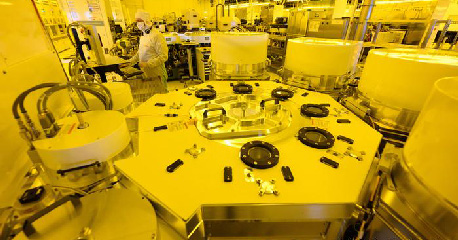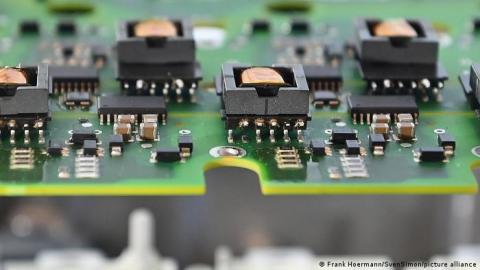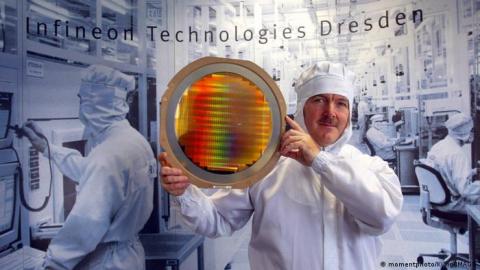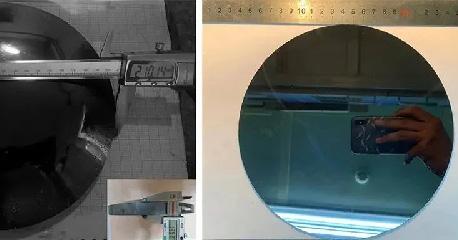
Almost every week there are reports about the construction of semiconductor factories in the United States or Europe. Germany's Infineon is building a plant in Dresden, and US chipmaker Intel is building a plant in Magdeburg. There have been persistent rumors that Taiwanese chip giant TSMC is considering building a factory in Germany. The U.S. administration under Biden has successfully lured TSMC and South Korea’s Samsung to the U.S. — where Asians are building multibillion-dollar chip factories.
The trick is to use subsidies to attract foreign investment. The Inflation Reduction Act (IRA) support package alone is worth $370 billion. In addition, there is the "Chips and Science Act" (Chips and Science Act) with a total allocation of US$280 billion, which aims to strengthen the strength of the United States in the semiconductor field, promote research and development, and create regional high-tech centers. In addition, more professionals from STEM fields (science, technology, engineering and mathematics) will receive grants from the funding pool. In Germany, this field is equivalent to the MINT subject areas (Mathematics, Computer Science, Natural Sciences and Technology).

But in the long run, can German and EU high-tech companies resist the temptation of US subsidies? The European Chips Act (EU Chips Act) is equipped with funds of about 43 billion euros, with the goal of doubling the EU's current semiconductor production in the global chip manufacturing market by 2030, from less than 10% currently. to about 20%. Is this much money enough to achieve the same goal?
European industry representatives have been unable to hold back and want to catch up. Andreas Gerstenmayer, chief executive of Austrian technology group AT&S, complained to Handelsblatt in late November that “Europe is a giant of language when it comes to announcements, but a dwarf of action when it comes to operations.” "The amount of funding is too small to have a global impact."
Worried about relocating your company?
Europe has already begun to worry that important companies will move to the United States. Industry expert Marcus Gloger, a partner at PwC Strategy Consultants, doesn't think so.
"Europe is constantly criticized for producing only about 10 percent of the world's chips. But it should also be taken into account that Europe has cutting-edge knowledge in key areas and a well-trained workforce. These elements are all underestimated. Building factories in any Any place is fine, but high-quality labor is not available everywhere.”
Europe still has a geographical advantage. "Europe has a long history of semiconductor research and development, with many R&D centers and strong scientific research capabilities."
These include the Microelectronics Research Center (IMEC) in Leuven, Belgium - a technologically leading independent research and development center in Europe, unique in that even competitors can conduct research together in the same laboratory; located in the surrounding area of Munich Silicon Saxony (Silicon Saxony) near Dresden, where Bosch invested 1 billion euros to build a new fab in Dresden last year; and the Grenoble Technology Park (French Silicon Valley) .
Thinking of Europe's advantages in the semiconductor industry, including strong scientific research strength and market leadership in some areas, Glog said that "it is not so worrying." After all, there is not only the European Chips Act, but also the European Recovery Fund, which sets the same goals as the US Inflation Cutting Act. Glog explained that by 2030, the total funding across the EU will amount to around 1.9 trillion euros.
Brussels understands the point
Senior officials and experts of the European Commission are committed to allowing Europe to participate more in the field of high-end chip production and research and supercomputing in the future. IT experts and cybernetics experts stress that protecting digital sovereignty will be more important than securing supply chains in the future. Because, the more progress is made in the digitalization of countries and societies, whether through the Internet of Things (IoT) or through artificial intelligence (KI), the more German and European technological sovereignty has to be guaranteed.

Two of the world's four most powerful supercomputers are already in Europe, in Bologna, Italy, and Finland. By 2024, Germany's first exascale supercomputer will be ready in Jülich in NRW. The supercomputer, called JUPITER, is capable of more than 1,000 petaflops of calculations per second, which is equivalent to more than 5 million modern laptops. Over the next few years, exascale supercomputers will be launched in Munich and Stuttgart. Whether it is climate models, new material development, process optimization, biopharmaceutical research, deep learning or artificial intelligence – without supercomputers, national and industrial economic sectors would soon be derailed from cutting-edge technologies in the digital age.
Subsidies alone are not enough
Glogg believes that the assumption that "where there are more subsidies, companies will go" is wrong. "What enterprises need is a complete ecosystem. It is not enough to build a chip factory, but also requires raw materials and scientific research, as well as a complete enterprise network. High-level professionals are globalized, and these senior professionals are located in Europe and China. You can get the same salary as the United States. A good environment and the correct framework conditions are the key to retaining talents.”
That's why it's important for these top talents that being in Europe means having options. Because when they move their family to another country or continent, it can be very attractive for them to know that there is one or two other companies in the region that they can move to besides the company they work for. "I don't think enough attention has been paid to this aspect," Glogg emphasized.

Furthermore, Europe remains a leader in R&D. In Germany, top researchers at the Fraunhofer and Max Plank-Institutes are also well-known scientists leading the development of Industry 4.0. It was followed by the Leibniz-Institute and the Ferdinand-Braun-Institut.
infrastructure matters
In terms of semiconductor industry clusters, Germany does not need to hide its edge. Saxony Silicon Valley, located around Dresden, the capital of Saxony, is one of the largest semiconductor industry centers in Europe and has great industrial prospects. "Here, you'll find about 200 businesses related to 'semiconductors.' All the machines needed to produce semiconductors require a full range of support from different specialist suppliers," Glogg said.
It only makes sense for a vendor to provide maintenance and technical support to the base "if there is a specific infrastructure and multiple customers in an enterprise ecosystem." "It's not about getting maintenance service in a day or two or so, it's about being on site within, say, five to 10 minutes."
Because as a semiconductor factory, if production is stopped for a month, the cost of about 200 million euros will soon be incurred. The industry expert emphasized: "It costs 1.5 to 15 billion euros to build a chip factory, but if the construction period is delayed by one month due to reasons such as the foundation cannot be poured, it will often immediately cause hundreds of millions of dollars in losses."
Europe has talents, is at the forefront of research, and has a world-leading semiconductor industry cluster. Dutch semiconductor equipment maker ASML, industrial optics group Zeiss, and industrial laser specialist Trumpf are all based in Europe, as are manufacturers of industrial gases and clean space technology.
"What we lack is the speed of execution. We Europeans need to be braver and more determined when making decisions. I think the German government and the entire industry can do this." - Glog is convinced of this.

